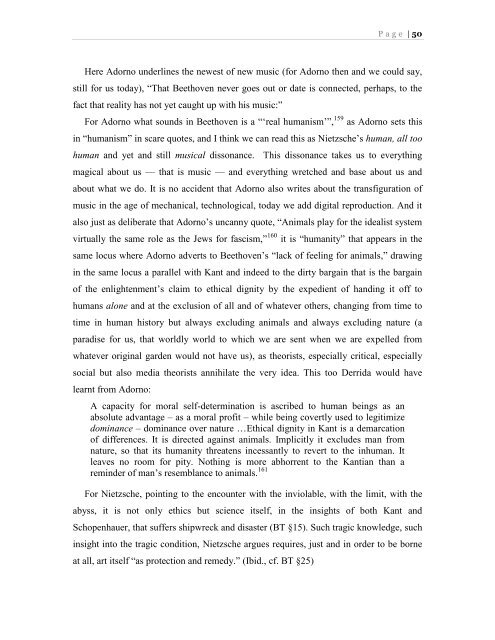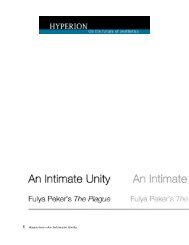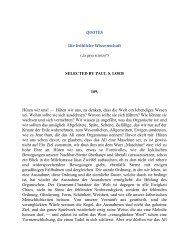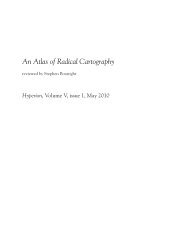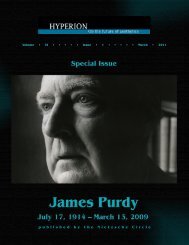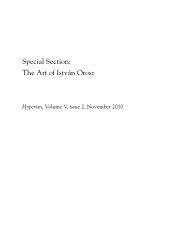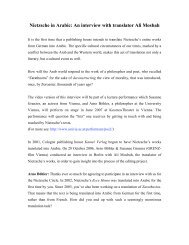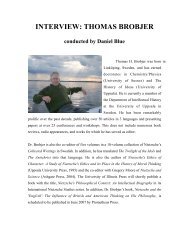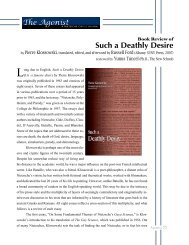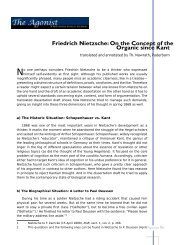Music, The Birth of Tragedy, and Nietzche's ... - Nietzsche Circle
Music, The Birth of Tragedy, and Nietzche's ... - Nietzsche Circle
Music, The Birth of Tragedy, and Nietzche's ... - Nietzsche Circle
You also want an ePaper? Increase the reach of your titles
YUMPU automatically turns print PDFs into web optimized ePapers that Google loves.
P a g e | 50<br />
Here Adorno underlines the newest <strong>of</strong> new music (for Adorno then <strong>and</strong> we could say,<br />
still for us today), “That Beethoven never goes out or date is connected, perhaps, to the<br />
fact that reality has not yet caught up with his music:”<br />
For Adorno what sounds in Beethoven is a “‘real humanism’”, 159 as Adorno sets this<br />
in “humanism” in scare quotes, <strong>and</strong> I think we can read this as <strong>Nietzsche</strong>’s human, all too<br />
human <strong>and</strong> yet <strong>and</strong> still musical dissonance. This dissonance takes us to everything<br />
magical about us — that is music — <strong>and</strong> everything wretched <strong>and</strong> base about us <strong>and</strong><br />
about what we do. It is no accident that Adorno also writes about the transfiguration <strong>of</strong><br />
music in the age <strong>of</strong> mechanical, technological, today we add digital reproduction. And it<br />
also just as deliberate that Adorno’s uncanny quote, “Animals play for the idealist system<br />
virtually the same role as the Jews for fascism,” 160 it is “humanity” that appears in the<br />
same locus where Adorno adverts to Beethoven’s “lack <strong>of</strong> feeling for animals,” drawing<br />
in the same locus a parallel with Kant <strong>and</strong> indeed to the dirty bargain that is the bargain<br />
<strong>of</strong> the enlightenment’s claim to ethical dignity by the expedient <strong>of</strong> h<strong>and</strong>ing it <strong>of</strong>f to<br />
humans alone <strong>and</strong> at the exclusion <strong>of</strong> all <strong>and</strong> <strong>of</strong> whatever others, changing from time to<br />
time in human history but always excluding animals <strong>and</strong> always excluding nature (a<br />
paradise for us, that worldly world to which we are sent when we are expelled from<br />
whatever original garden would not have us), as theorists, especially critical, especially<br />
social but also media theorists annihilate the very idea. This too Derrida would have<br />
learnt from Adorno:<br />
A capacity for moral self-determination is ascribed to human beings as an<br />
absolute advantage – as a moral pr<strong>of</strong>it – while being covertly used to legitimize<br />
dominance – dominance over nature …Ethical dignity in Kant is a demarcation<br />
<strong>of</strong> differences. It is directed against animals. Implicitly it excludes man from<br />
nature, so that its humanity threatens incessantly to revert to the inhuman. It<br />
leaves no room for pity. Nothing is more abhorrent to the Kantian than a<br />
reminder <strong>of</strong> man’s resemblance to animals. 161<br />
For <strong>Nietzsche</strong>, pointing to the encounter with the inviolable, with the limit, with the<br />
abyss, it is not only ethics but science itself, in the insights <strong>of</strong> both Kant <strong>and</strong><br />
Schopenhauer, that suffers shipwreck <strong>and</strong> disaster (BT §15). Such tragic knowledge, such<br />
insight into the tragic condition, <strong>Nietzsche</strong> argues requires, just <strong>and</strong> in order to be borne<br />
at all, art itself “as protection <strong>and</strong> remedy.” (Ibid., cf. BT §25)


